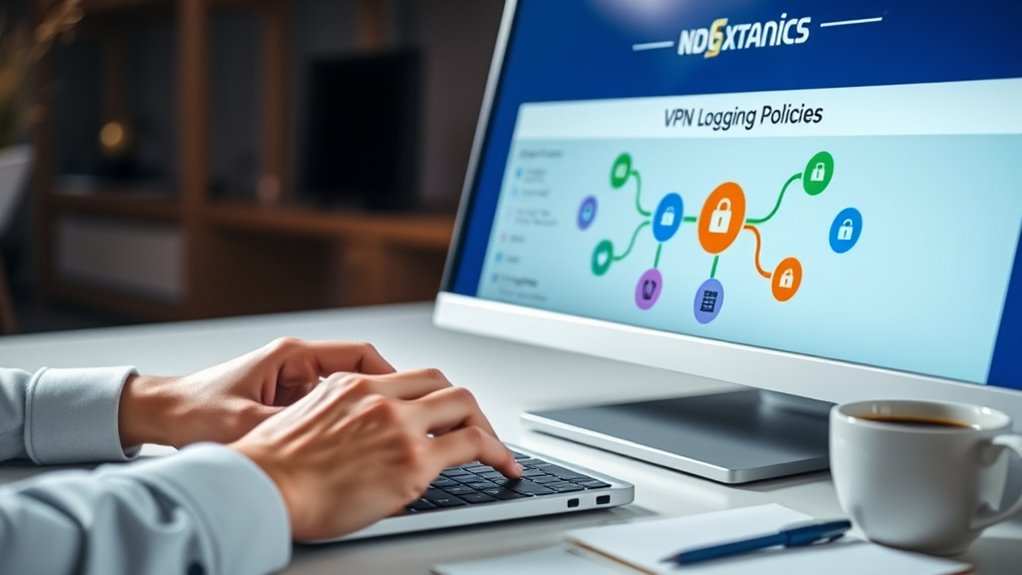Learning about VPN logging policies helps you understand what data the service collects, how long they keep it, and how laws in their jurisdiction may impact your privacy. Some VPNs claim to keep no logs, but others retain connection data or IP addresses. Your privacy depends on these policies and the country’s laws. To stay protected, it’s essential to learn how different providers handle your information — and there’s more to discover about these policies.
Key Takeaways
- VPN logging policies determine what user data is stored, such as browsing activity, connection times, or IP addresses.
- “No-logs” VPNs claim not to retain activity data, but policies vary between providers.
- Local laws in a VPN’s jurisdiction can require data retention despite privacy claims.
- The legal environment influences how long and what data VPNs can store.
- Evaluating a VPN’s jurisdiction and policy details is essential for assessing privacy and logging practices.

Have you ever wondered what happens to your data when you connect to a VPN? When you hit that connect button, your device initiates a secure tunnel to the VPN server, but what’s happening behind the scenes can vary widely depending on the provider’s logging policies. VPNs use encryption protocols like OpenVPN, IKEv2/IPSec, or WireGuard to secure your data, ensuring that your information remains private as it travels across the internet. These protocols scramble your data so that anyone attempting to intercept your connection sees only indecipherable code. However, encryption alone doesn’t guarantee privacy; it’s equally important to understand what the VPN provider keeps in logs, or doesn’t, and how data retention laws influence their policies.
Many VPN providers claim to be “no-logs” services, but the truth can be more complicated. Some companies may not store your browsing history or specific activities, but they might retain connection timestamps, bandwidth usage, or even your IP address for a certain period. This is where data retention laws come into play. Different countries have various regulations that compel VPN providers to keep certain types of data for legal or security reasons. For example, some jurisdictions require ISPs or VPNs to retain user data for a set number of months or years to assist law enforcement investigations. When a VPN operates under such laws, its no-logs claim may be limited or less trustworthy. It’s essential to know the jurisdiction where your VPN provider is based and whether local laws could impact your privacy. Understanding the types of logs that a VPN might keep is crucial for assessing its privacy claims.
Frequently Asked Questions
How Do VPN Providers Store User Data Securely?
You want to know how VPN providers store your data securely. They use strong encryption standards like AES-256 to protect your information from hackers. Additionally, reputable VPNs minimize data retention or store only essential details, reducing risks if data is compromised. This combination of robust encryption and careful data retention policies guarantees your online activities stay private and secure, giving you peace of mind when browsing.
Can Logging Policies Change Without User Notice?
It’s possible that policy updates can happen without immediate user notifications, although many providers try to keep you informed. VPN companies may modify their logging policies over time to adapt to new regulations or internal standards. While some notify users of changes, others might not. To stay protected, regularly review your VPN’s user notifications and policy updates, ensuring you’re aware of any shifts that could affect your privacy.
What Legal Obligations Influence VPN Logging Practices?
Legal obligations heavily influence VPN logging practices. You need to be aware that laws demanding data retention and legal compliance can require VPN providers to log user activity. These regulations vary by jurisdiction, so your VPN’s logging policies might change to meet legal standards. As a user, it’s essential to review the provider’s policies regularly, ensuring they align with local laws and your privacy expectations.
How Do VPN Logs Impact User Anonymity?
You might think VPN logs always compromise your anonymity, but that’s not necessarily true. While logs can impact anonymity preservation by providing data traceability, many VPNs limit logging to protect user privacy. If you choose a VPN with strict no-logs policies, your activities stay private, ensuring your anonymity remains intact. So, understanding how logs work helps you pick a provider that prioritizes your privacy and keeps your online presence secure.
Are There VPNS With Zero-Logging Guarantees?
You might wonder if any VPNs offer zero-logging guarantees. Some providers prioritize VPN transparency and claim to keep no logs of your activity, ensuring your data remains private. They use strong data encryption to protect your information, giving you peace of mind. While it’s important to choose a reputable VPN with clear policies, zero-logging guarantees are increasingly common among trustworthy services. Always verify their policies before subscribing.
Conclusion
So, next time you pick a VPN, remember that logging policies might just surprise you. Coincidentally, what you don’t see on the surface often holds the key to your privacy. By understanding these policies, you can make smarter choices and stay truly protected. After all, it’s your data, and knowing the ins and outs can make all the difference—sometimes, what’s hidden matters more than what’s advertised.









